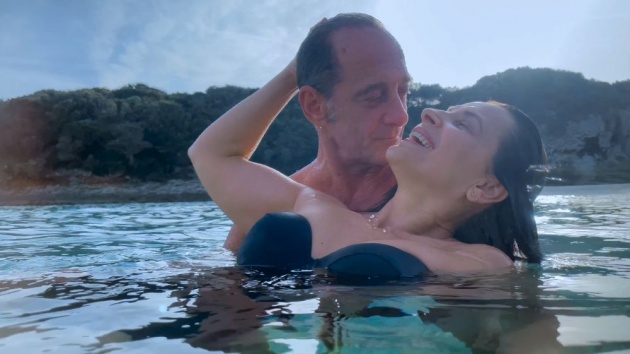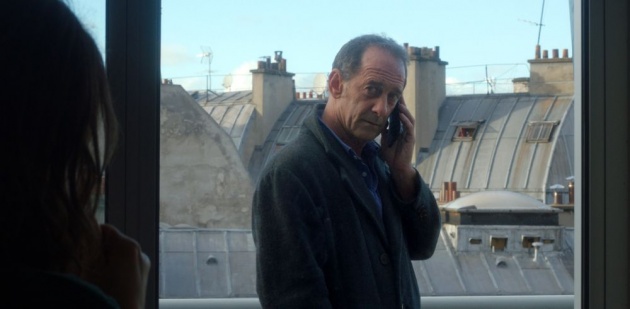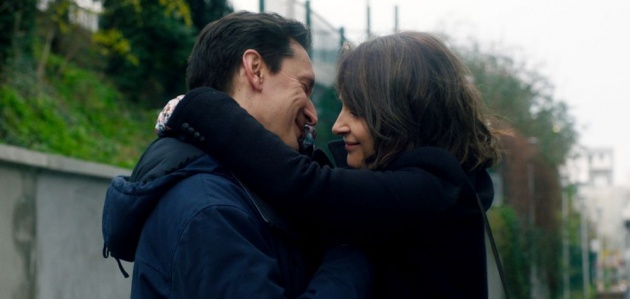
Pictured: A baptism of love. Jean (Vincent Lindon) and Sara (Juliette Binoche) in a scene from 'Avec Amour et Acharnement' ('Both Sides of the Blade') a French film directed by Claire Denis. Photograph courtesy of Curiosa Films (France) / Curzon (UK)
Contains spoilers
In her third collaboration with director Claire Denis, Avec Amour et Acharnement (‘With Love and Fury’, re-titled in English as Both Sides of the Blade), Juliette Binoche plays Sara, a radio talk show host who is torn between two men, her partner Jean (Vincent Lindon), an ex-con and former rugby player whose bi-racial son from his first marriage, Marcus (Issa Penca) is raised by his mother, Nelly (Bulle Ogier) and her ex, François (Grégoire Colin) who re-appears in her life first outside the offices of the radio station where she works and then as he goes into business running an agency for young rugby players. Unusually, Denis doesn’t make Sara her principal viewpoint character. Rather, she gives equal screen time to Jean, this also being Lindon’s third film with Denis. Outdoing both of them, Colin re-unites with Denis for their seventh film together, after Nenette et Boni, Beau Travail, Vendredi Soir, The Intruder, 35 Shots of Rum and Bastards. If nothing else, Denis inspires loyalty.
Denis worked with Christine Angot to adapt the latter’s novel, Un tournant de la vie, updating the action to 2021 Covid-affected Paris, complete with a reference to the explosion in Beirut on 4 August 2020 and a debate about skin colour and access to opportunity. This is a film that contrasts Sara’s radio shows in which she interviews Hind Darwich and Lilian Thuram with Jean’s trips to Vitry, where his son and mother live and where Jean does his shopping. At one point, Sara asks him to justify his trips. Jean argues that in Vitry, the petrol is cheaper.
In another director’s hands, this might have been the story of how Sara chooses between two men, what each one means to her. Denis is more interested in the forces placed on a fragile relationship that cause it to fail. These are variously: the past; the torment over being an ineffective role model; a desire to turn a man into something he is not; and the anticipation of a wife able to make a choice.
In the film’s opening, the film switches from the first and second shot between the portentous and lushly romantic. The opening image is a long shot of Sara and Jean standing shin-deep in a shallow of water. Then there is a medium close up of the pair close to each other, Sara lying back in her black swimsuit, Jean kissing her. A montage set to instrumental music follows as Sara and Jean frolic like young lovers. A shot from under the water shows their legs as they walk together, trampling sand and seaweed underfoot. The romantic music continues into the next image, a shot from the point of view of an RER train pulling into the platform of an underground station. Denis cuts before the train stops. This is followed by a pan over a set of Parisian rooftops against a grey sky. Then we see the inside of their apartment. As the front door is pushed open, we see a modest pile of envelopes pushed away. Jean picks up a selection of them, giving them a cursory glance before putting them on a sideboard. Sara picks up the rest and puts them with the others. Jean stands on the balcony and rolls up a window blind. Sara stands behind him, impeding his action. She wants Jean to join her in bed. Naturally, he acquiesces.

Pictured: Seen through a screen, Jean (Vincent Lindon) in a scene from 'Avec Amour et Acharnement' ('Both Sides of the Blade'), a French film directed by Claire Denis. Still courtesy of Curiosa Films (France) / Curzon (UK)
Throughout this opening, we don’t hear a word spoken between the pair until the next day when Jean asks to borrow Sara’s bank card (‘Carte Bleu’). ‘Wouldn’t you prefer a bank transfer?’ she asks. ‘No,’ he replies. He then states that he doesn’t need her bank card. There is a terse exchange before Sara leaves. Jean notices Sara’s bank card on the floor. He picks it up.
Arriving at her place of work, having taken the train, Sara (wearing a disposable blue face mask) is surprised to see a familiar face carrying a motorcycle helmet – François. He is with a woman. It is unclear whether he sees her. Where Jean is rough, François is smooth. He has a youthful, if smug-looking face. Sara shudders. In her studio, however, she is a different woman, confidently interviewing Hind Darwich. Hind describes how awful things are in Lebanon; Sara’s show (which blends music and discussion) offers her a platform without argument. In this brief sequence, Denis reminds us of a world outside that of her characters with (so-called) ‘wicked’ problems that are hard to solve.
Sara is horrified to learn that Jean has gone into business with François, attending an interview with the bank and forgetting one document. We don’t know how Jean and Sara got together but at this stage in the drama, François doesn’t know that Jean and Sara are a couple; Jean makes François wait outside their apartment building. Sara tries to keep any latent feelings for François in check. She recalls an incident in which the three of them went out. At the end of evening, Jean returned to his then wife, who lived on the rue d’Amsterdam. François, however, did not go home with Sara. Sara recalls how jealous she was of Jean. Jean assures her that she is now ‘his rue d’Amsterdam wife’.
Meanwhile, Nelly struggles with her attempts to raise the fifteen-year-old Marcus, who helps himself to snacks rather than stay with her to enjoy a healthy breakfast. During a trip out, Nelly discovers that her bank card is missing; Marcus had taken it. He has a lot going on in his life, though we are not privy to it. He’s not keen on conversing with his father. Jean foregoes a business meeting in order to see Marcus. Nelly won’t let Jean inside. ‘He doesn’t want to see you,’ she explains. Jean, who doesn’t kiss his mother because of Covid – ‘I don’t have my mask,’ he explains – explains that he won’t be able to come back. Ogier’s acting is awkward; she’s too defensive, her gestures quiver. A dog barks throughout the encounter. Jean curses the owner. Nelly joins in. Jean sees Marcus looking at him from the window and calls to him. Marcus doesn’t respond. In an earlier scene, Denis uses background noise to unsettle the audience. The music (by frequent Denis-collaborator, Tindersticks) would not be out of place in a thriller.
Jean visits a rugby ground and shares a video with Sara, in which she again sees François. Jean is ostensibly showing Sara the stadium, but François wanders into shot. Her view of François is mediated by a small mobile phone screen, just as in earlier scenes in their apartment, Sara looks at Jean through a window before joining him in the balcony. Here, Denis suggests that Sara would like nothing more than to wander into the screen (as it were), just as she walked through the sliding window door to join Jean. Denis uses the window motif again when Sara and François finally speak.
There is an awkward scene in which Sara tells Jean that she would like to attend the opening of his agency. Jean explains that he will be busy, talking to young players. Nevertheless, he acquiesces. In one of the scenes in Jean and Sara’s apartment, Denis holds the camera on both characters, covering the scene in a single take. Towards the end of the scene, the camera pans so that only Jean is in the frame; Sara is still talking, but she is out of shot. Denis signals her interest in Jean, how his needs are important. We also see, somewhat distractingly, pictures of Sara with a young child on a refrigerator. These photographs are never explained – did Sara lose a child? Is she an aunt estranged from her nephew? Denis hints that there is more to Jean, Sara and François’ story than we are ever told.
Sara emerges at Jean and François’ office in a glamorous black coat, the collar of which she pulls around her neck, so she wears it almost like a cape. She approaches the building, with a balloon arch bearing a sponsor’s name, with trepidation. Jean rushes out to greet her. ‘Marcus is here,’ he tells her excitedly. Sara enters a crowded reception area. She meets a man she knows. ‘François is here,’ he tells her. Sara flees the building and stands in the car park. Jean calls her. After explaining what she had done, Jean hands the phone to François. We hear his voice for the first time. He looks up and sees him with a phone to his ear. ‘Where are you?’ he asks. ‘Outside,’ she replies. Then he sees her, a smile crossing his face, though as Colin plays him, it’s a smarmy, self-congratulatory smile. ‘Come up,’ he says. We then see Sara mounting the stars with excitement, as if about to be given the star prize. Marcus looks at her as she advances towards François but says nothing. Denis cuts to a woman – François’ motorbike companion – scowling with disapproval. At the end of the evening, Sara monologues to herself, to us, to the stars: ‘Now it begins… the phone calls. Getting wet.’ Denis isn’t shy about expressing female sexual anticipation, even if she does so in a non-naturalistic way.

Pictured: 'Now we are together.' François (Grégoire Colin) and Sara (Juliette Binoche) in a scene from 'Avec Amour et Acharnement' ('Both Sides of the Blade') a French drama directed by Claire Denis. Still courtesy of Curiosa Films (France) / Curzon (UK)
Setting the film while Covid protocols are still in place, Denis makes the point that we are used to seeing people through screens, being simultaneous close but far away. The opening of the film celebrates the absence of screens: two figures in water. Denis knows that the audience does not want to see their favourite actors wearing face masks. As Sara, Binoche is seen wearing one. Jean acknowledges that he should wear one, but François, smug to the end, never does.
We see Sara and François walking down the street, arm in arm, Sara’s surgical mask hanging from her ear. ‘Now we are together,’ François explains. ‘Yes,’ Sara agrees. Naturally, they go to bed. François wants her to turn round, so he can touch her rear. ‘But I want to see you,’ Sara pleads. She acquiesces, only for François to take advantage. ‘No,’ cries Sara. ‘No, no, no.’ Francois leaps out of bed, putting on his trousers. ‘Stay, come back to bed,’ pleads Sara. François insists he’ll stay, but he won’t go back to bed. He’ll sit on the toilet and read. A bare-chested Grégoire Colin cuts quite the comic figure as he does this. There’s a cut and he’s back in bed.
Meanwhile Jean is in Vitry with Marcus asking what he wants to do after he leaves school. ‘I want to take an apprenticeship and go into retail.’ Jean is appalled, claiming Marcus will never get any respect if he goes straight into retail. ‘I am Jean. You are Marcus. We are men. I’m not just an ex-rugby player, an ex-con. You can do anything.’ Nelly interrupts: ‘Jean?’ ‘I am talking to Marcus, he tells her. ‘So, Marcus what do you want to do?’ ‘I want to go into retail.’ At the end of the scene, Jean gives Marcus some bank notes. ‘Don’t take your grandmother’s card,’ he tells him.
Towards the end of the film, Sara and Jean row. Sara having a bath and knocking her phone into the bathwater. She is later told ‘it is fried’. Sara talks about all of the feelings of the past coming back. Jean is enraged. ‘The past? I’m not interested. I don’t want to live in the past.’ He has no time for Sara’s emotional struggles and storms out. Later, he returns. ‘Marcus is missing,’ he tells her. He goes out in search of him.
After Jean calls on Marcus’ classmates and a garage where (I presume) he hung out, Marcus is seen on a station platform watching large passenger trains zoom pass. Trains in the film have been associated with Jean and Sara from the film’s opening and a scene where Sara goes to work. A woman (Mati Diop) who knows Marcus approaches him. ‘Your father and grandmother are looking for you,’ she tells him. ‘Go home.’ Marcus agrees.
As Sara travels home from work, she receives a call from François. ‘Guess where I am?’ Sara plays the game. ‘In a café?’ ‘No.’ ‘In the park?’ ‘No.’ Sara starts to worry. ‘I’m in your apartment, waiting for Jean.’ Sara is horrified. Jean arrives home. Words are spoken with François. He leaves. Sara asks about Marcus. ‘We found him.’ Jean is full of ‘acharnement’ [anger]. François had showed him texts. He told Jean to leave Sara. ‘What texts?’ she asks. Jean quotes from them, but he’s angry that Sara would try to gaslight him. He tells her that he will no longer work with François and that he would stay with her and love her forever if she asked him. Sara says nothing. Jean leaves. François, now not quite so smug, calls Sara. She does not answer. He walks away. Over the end credits, Jean trains with young rugby prospects with Marcus alongside. Marcus cradles a rugby ball. The inference is that he has joined the family business.
Denis has a habit of using the end credits to continue the story – she did so in her 2017 film, Let the Sunshine In. She demonstrates an even-handedness and interest in issues outside of her drama. She is an authentic auteur with a style of her own and a thematic interest in the fragility of connection. The film takes its English language title from a song over the end credits sung by Stuart A. Staples of Tindersticks. She doesn’t dwell on Sara in the film’s closing moments, rather concentrating on Jean who is attempting something meaningful, putting the past behind him. Does this mean that Denis is anti-feminist? I don’t think so. Sara could not move on from her past whereas Jean is capable of doing so; Denis celebrates the latter. Sara lives her life through an enlightened set of values, but is vulnerable to desire, albeit on her terms. Living in a Covid world means accepting restrictions necessary to save lives. Sara doesn’t make the necessary sacrifice and is left in torment. Denis does not turn her into a villain, wanting to hurt her partner, rather someone in the throes of emotions that she cannot control. Binoche and Lindon give sympathetic performances. Even when Sara lies to Jean, we know why she is doing it, so she can keep Jean in reserve while she works through her feelings. She does not allow herself to be played.
Both Sides of the Blade is a film about mature people working through emotions. It won’t send you leave the cinema with a smile on your face. It is a tragedy of sorts, one in which wounded individuals pick themselves up and carry on.
Reviewed at Curzon Bloomsbury, Russell Square, London, Thursday 26 July 2022 and Curzon Victoria, Screen Three, Central London, Thursday 22 September 2022, 17:30 screening



